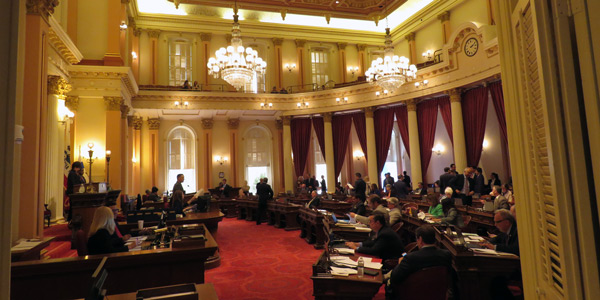By Jason Fordney
SACRAMENTO, Calif. — State legislation that would regionalize CAISO and mandate 100% zero-carbon retail electricity sales statewide by 2045 sputtered with just days left in the legislative session and will not pass this year, a key legislator told RTO Insider on Wednesday.
State Assemblymember Chris Holden (D), who sponsored two bills that would regionalize CAISO, said he plans to go forward with the regionalization effort next year. His main vehicle for regionalization, AB 726, was kicked back to the Senate Rules Committee yesterday and would need to be approved by a policy committee before returning to the State Senate floor.
That won’t happen, Holden said, because it was not assigned to a committee and will not be heard. Another bill with regionalization language, AB 813, was amended last week by the Senate and referred back again to the Rules Committee.
“What we wanted to do on the regionalization piece is make sure there was legislative review of whatever came out of a committee evaluation,” said Holden, who chairs the Assembly Utilities and Energy Committee. “We wanted that committee to be unanimous. The strategy was then to move to the legislature where people who represent all parts of California had a chance to sign up and speak. It is big legislation, and we wanted to make sure everybody had a say in it.”
Both bills also contain a provision that would require California electricity sellers with more than 100,000 customers to procure “tax-advantaged” renewable generation above that required by the state’s renewable portfolio standard and recover costs from retail ratepayers. The measure is intended to encourage the development of new renewable resources within the state before the expiration of federal production tax credits in 2020.
Holden said his focus initially was taking advantage of expiring tax credits on wind and solar, and there were also concerns in the geothermal community.
“Regionalization was introduced into the conversation around the bill, which I had no problem with doing, as long as it was broken into two pieces — multiple pieces — so it’s not like ‘here’s what we’re going to do and we are cutting everybody out,’” he said.
Independent Energy Producers Association CEO Jan Smutny-Jones said that regionalization would make it easier to export excess solar from California and allow access to lower-cost renewables around the West.
“Obviously, we have spent a lot of time on these issues this year. It’s unfortunate that we couldn’t quite get it out of the legislature this first year, but we look forward to working on it when we come back in January,” he said.
The ISO has allowed for more efficient use of transmission, and the same would be true with regionalization, Smutny-Jones said.
“From a market efficiency perspective, it will work a lot better,” he said. He noted that the Western Energy Imbalance Market (EIM) is working well on a regional basis, but it is only a five-minute market and does not allow day-ahead transactions like a full ISO.
CAISO itself also favors regionalization. It did not return a request for comment as of press time.
The zero-carbon bill, SB 100, introduced by Senate President pro Tempore Kevin de Leon and widely anticipated by the renewable energy community, faces strong headwinds, according to Holden. (See California Zero-Carbon Power Bill Advances.)
Of SB 100, Holden said, “That is not going to move — there is overwhelming opposition to it. And there is not time to work that out.” He is hoping to integrate the various proposals so there is “a global fix to everything. But we are out of time.”






